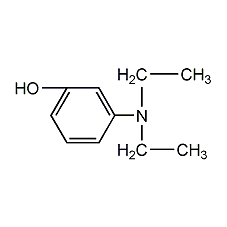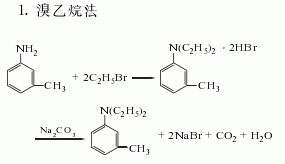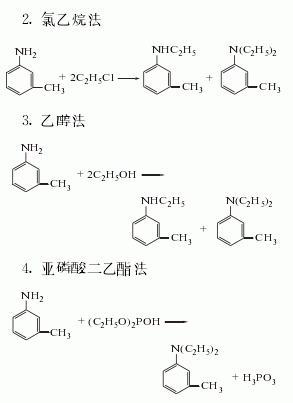
Structural formula
| Business number | 023Z |
|---|---|
| Molecular formula | C10H15NO |
| Molecular weight | 165.23 |
| label |
Metahydroxy-N,N-diethylaniline, 3-(diethylamino)phenol, 3-diethylaminophenol, 3-Diethylaminophenol, 3-(Diethylamino)phenol, Aromatic nitrogen-containing compounds and their derivatives |
Numbering system
CAS number:91-68-9
MDL number:MFCD00002265
EINECS number:202-090-9
RTECS number:SL0550500
BRN number:908212
PubChem number:24846564
Physical property data
1. Character: white or rose crystal
2. Density (g/mL, 25/4℃): 0.923
3. Relative vapor density (g/mL , air=1): Undetermined
4. Melting point (ºC): 78
5. Boiling point (ºC, normal pressure): 276~280
6. Boiling point (ºC, 5.2kPa): Not determined
7. Refractive index: Undetermined
8. Flash point (ºC): 141
9 . Specific rotation (º): Undetermined
10. Autoignition point or ignition temperature (ºC): Undetermined
11. Vapor pressure (kPa, 25ºC): Undetermined
12. Saturated vapor pressure (kPa, 60ºC): Undetermined
13. Heat of combustion (KJ/mol): Undetermined
14. Critical temperature (ºC): Undetermined
15. Critical pressure (KPa): Undetermined
16. Log value of oil-water (octanol/water) partition coefficient: Undetermined
17. Explosion upper limit (%, V/V): Undetermined
18. Explosion lower limit (%, V/V): Undetermined
19. Solubility : Soluble in water, ethanol, ether and alkali, slightly soluble in petroleum hydrocarbons.
Toxicological data
Oral ingestion, respiratory inhalation, and skin contact can cause poisoning, causing headaches, confusion and other symptoms. In severe cases, it can cause coma. Rat transdermal LD50: 1950mg/kg, rat inhalation LD50: 5950mg/kg, rat transdermal LD50: 5000mg/kg.
Ecological data
None yet
Molecular structure data
1. Molar refractive index: 51.71
2. Molar volume (cm3/mol): 158.8
3. Isotonic specific volume (90.2K ): 403.8
4. Surface tension (dyne/cm):41.7
5. Polarizability (10-24cm3): 20.50
Compute chemical data
1. Reference value for hydrophobic parameter calculation (XlogP): None
2. Number of hydrogen bond donors: 1
3. Number of hydrogen bond acceptors: 2
4. Number of rotatable chemical bonds: 3
5. Number of tautomers: 3
6. Topological molecule polar surface area 23.5
7. Number of heavy atoms: 12
8. Surface charge: 0
9. Complexity: 123
10. Number of isotope atoms: 0
11. Determine the number of atomic stereocenters: 0
12. Uncertain number of atomic stereocenters: 0
13. Determine the number of chemical bond stereocenters: 0
14. Number of uncertain chemical bond stereocenters: 0
15. Number of covalent bond units: 1
Properties and stability
Highly toxic, it is fatal if inhaled, ingested, or absorbed through skin contact. Its combustion produces irritating, corrosive and/or toxic gases.
Storage method
This product should be sealed and stored in a cool, dark place.
Stored in a cool, ventilated warehouse, away from fire, heat sources and direct sunlight. Store and transport separately from edible raw materials. Handle with care when transporting to prevent damage to the container.
Synthesis method
Using m-toluidine as the starting material, different alkylating agents are used, such as ethyl bromide, ethyl chloride, etc.


Purpose
Dye intermediates. Used to produce dyes such as acid rose red B, cationic brilliant yellow 10GFF, cationic emerald blue GB, acidic medium pink 3BM, basic rose essence B, basic rhododendron red and other dyes; it is also a variety of fluorescent whitening agents, especially coumarin Important intermediate for optical brighteners.

 微信扫一扫打赏
微信扫一扫打赏

